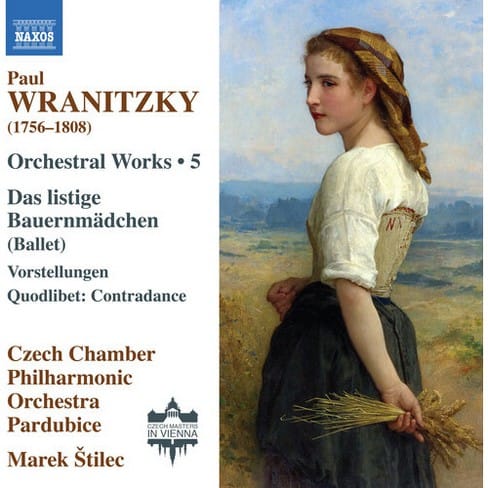
This disc continues Naxos’ sterling Wranitzky series: perhaps the most relevant to this new volume so far was Volume Four, which contained the complete “ballet-pantomime” Das Waldmädchen”; here, the first 52 minutes of this latest release is a ballet, Die listige Bauernmädchen (The Cunning Farmer Girl), complemented by two tremendous, and apt, fillers.
Czech-born Paul Wranitzky (Pavel Vranický) was a Masonic ‘brother’ of, and in the same lodge as, Mozart. Wranitzky was a favourite composer of the Empress Maria Theresa; Die listige Bauernmädchen is one of three written for her. The plot is not known, although there is an open of the same tile by Paisiello, and the plot of that seems to map on Wranitzky’s score.
Here’s Naxos’ summation of the purported scenario:
The self-made, rags-to-riches farmer Tulipano has bought a marquisate. Wanting to distance himself from his humble origins, he has by correspondence arranged a marriage between his son Giorgino and the Countess Olimpia di Sarzana, a young widow of suitable noble birth. Finding out about the imminent arrival of his bride-to-be, Giorgino despairs to his beloved Vespina, a wealthy neighbouring farmer girl. By resourcefully impersonating the awaited Countess, Vespina deceives Tulipano to bless the young couple and prepare the wedding. The real Countess di Sarzana arrives, but Tulipano fails to recognise her due to Vespina’s intervention. Outraged by this treatment, the Countess has two of her squires challenge the father and son Tulipano to a double duel. The Tulipanos are about to lose the battle when Vespina’s servants come and chase the adversaries away. After having married his son to Vespina, the old Marquis discovers the deception. To try to remedy her offended honour, Tulipano offers his own hand in marriage to the Countess. Surrendering to the pleas from the young couple, the Countess accepts the father in place of the son. The unexpected double marriage resolves all conflicts.
The field of ballet is clearly one that appealed to Wranitzky, and one in which he was comfortable: the Wranitzky Project lists 15 ballets, four of which are lost and one of which is doubtful.
Here’s the Overture, as one might expect full of verve; and just listen to the lower string articulation from the Pardubice players, caught in a fine recording at the House of Muic in that lovely Czech city. Note the rustic drones in open intervals Wranitzky uses, too:
Intriguingly, the ballet is heard in 22 tracks but has 17 movements: the reason is that some of them ar split into ‘halves’: movement number 1 1/2 for example is a short “Furlana,” perhaps more sensibly referred to as “1b” by YouTube:
Wranitzky has a particular penchant for woodwind writing, as you can hear form this Allegro (one of many examples in this piece):
.. but not just wind; David Matoušek is the fine solo cellist here (his contribution comes just after the 1″20 mark). This is most probably a march announcing the arrival of the “false Countess”:
But the sheer delight of the piece is its pervading rusticity, heard nowhere better than in this characterful title dance:
Wranitzky’s music is perfectly of its time, perfectly crafted, and heard in what must be the perfect performance. Perhaps the “Tempo di Marcia” (No. 14) offers a clue to another aspect of Wranitzky’s affections: the outdoorsy feel of woodwind Harmoniemusik: the wind are treated as a composite unit, bright and breezy:
No doubting the glaring optimism of the finale, a “Contredanse” that seems to be a summation of all that is great and good about Wrantizky:
The ballet would be a treat in and of itself, but there are two more delights to come …
The Vorstellungen of 1803 strike me as distinctly Beethovenian, if from that Master’s second drawer; the sky darkens immediately. Continuing the theme of ballet, “Vorsellungen” can mean “imaginations”. There is a pronounced shift from the drama of the opening “Introduzione” to the opening out of the second movement (Allegro-Menuetto):
The delightful No. 3 (Allegro non troppo) features some individual scoring: piccolo, mandolin, flute, clarinets, and pizzicato violins:
That dramatic ballet-divertissement, Vorstellungen, was part of Emperor Franz II’s birthday celebrations in 1803, as was an extensive Quodlibet zum 13th Februar 1803, from which the Pardubice players have selected the colourful “Final Contradance,” as bright and breezy as one would want:
A fine continuation of the Naxos Wranitzky series, then, concentrating on that composers output for the ballet. The Czech Chamber Philharmonic Orchestra Pardubice are in strong form, their belief in this music never in doubt for a second.
The Naxos disc is available at Amazon here; Spotify and iDagio below.









%20Craig%20Fuller.jpg?w=160&resize=160,160&ssl=1)
